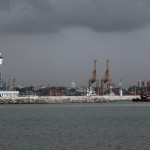India and Sri Lanka signed six agreements on energy connectivity during President Ranil Wickremesinghe’s recent visit to India. The most significant of these are proposals to build an oil pipeline from India to Sri Lanka, to connect the electricity grids of the two countries and cooperation in renewable energy and other green infrastructure.
These are mutually beneficial agreements. India is now the world’s second largest importer and third largest refiner of crude petroleum. It is also a large exporter of finished petroleum products such as diesel, petrol and kerosene. India’s petroleum refineries are among the largest and the most efficient globally. Sri Lanka buying oil from India will enable it to gain from India’s economies of scale in sourcing and processing oil. Building a new but relatively smaller scale oil refinery in Sri Lanka will be capital intensive, and operations will be more expensive compared with the much larger Indian facilities.
This is an important consideration at a time when Sri Lanka is in a balance of payments crisis and is trying to get its economy on track. It has faced fuel shortages in the past year, unable to pay for oil imports due to low foreign exchange reserves. Now, Sri Lanka can pay for India’s oil exports in the Indian Rupee, giving it more options and reducing the strain on Colombo’s dollar reserves. One benefit for India will be the wider use of the Indian currency – a long term objective for Indian policymakers.
The other potentially transformative proposal is to connect the electricity grids of the two countries via a subsea cable. This plan has been on paper for over a decade[1] but is now more achievable due to improving India-Sri Lanka ties. This will advantage both sides. India’s electricity is amongst the cheapest in the world, as India relies on locally produced coal and indigenous technology to produce power. Such options are not available to many of India’s neighbours, which rely on imported (and expensive) natural gas for their electricity needs.[2] Grid connectivity will allow Sri Lanka to purchase cheaper electricity from India, rather than build a new power plant from scratch. It will enable development of Sri Lanka’s significant wind power potential, which requires capital and market access, and is too large for the island nation to absorb on its own. Selling this clean, but intermittent electricity to India will provide Sri Lanka with another source of export income.
These agreements can have regional impact too, particularly for a more economically integrated Bay of Bengal region. India already has oil pipelines and power transmission lines connecting itself to Nepal and Bangladesh. The same model can work with Sri Lanka, The Bay of Bengal region has historically suffered from inadequate physical, digital and energy connectivity between the regional states. This is gradually being remedied, with energy leading the way.
Amit Bhandari is Senior Fellow for Energy, Investment and Connectivity, Gateway House.
This blog was exclusively written for Gateway House: Indian Council on Global Relations. You can read more exclusive content here.
For permission to republish, please contact outreach@gatewayhouse.in.
Support our work here.
©Copyright 2023 Gateway House: Indian Council on Global Relations. All rights reserved. Any unauthorised copying or reproduction is strictly prohibited.
References
[1] Wijayatunga, Priyantha, D. Chattopadhyay, and P. N. Fernando. “Cross-Border Power Trading in South Asia: A Techno Economic Rationale.” Asian Development Bank, August 28, 2015. https://www.adb.org/publications/cross-border-power-trading-south-asia.
[2] Radcliffe, Verity. “Pakistan’s Dependence on Natural Gas Is Turning into a Nightmare.” Oil and Gas News | Al Jazeera, September 28, 2021. https://www.aljazeera.com/economy/2021/9/28/pakistans-dependence-on-natural-gas-is-turning-into-a-nightmare.


